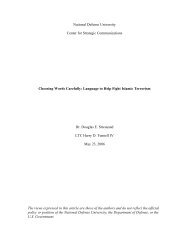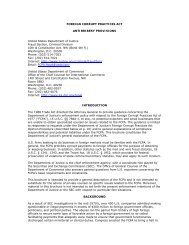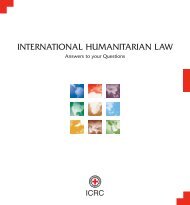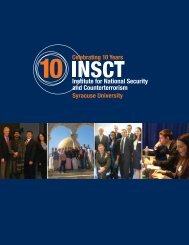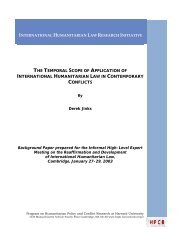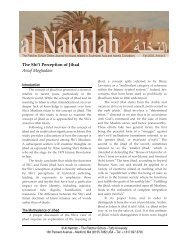some reflection on post-enlightenment qur'anic hermeneutics
some reflection on post-enlightenment qur'anic hermeneutics
some reflection on post-enlightenment qur'anic hermeneutics
You also want an ePaper? Increase the reach of your titles
YUMPU automatically turns print PDFs into web optimized ePapers that Google loves.
Special] Post-Enlightenment Qur’anic Hermeneutics 1407This Article suggests that <strong>on</strong>e aspect of Qur’anic <strong>hermeneutics</strong>, 9 abranch of the discipline that I call Post-Enlightenment Qur’anic Hermeneutics,10 while c<strong>on</strong>troversial and <str<strong>on</strong>g>some</str<strong>on</strong>g>times undertheorized, has the best potentialto help tear down the barrier that now exists am<strong>on</strong>g the linguisticallydistinct discourses previously described. In my view, Post-EnlightenmentQur’anic <strong>hermeneutics</strong> also offers the best possibility for finding soluti<strong>on</strong>sto problems of interpretati<strong>on</strong> that bedevil today’s Islamic jurists and schol-Interpratati<strong>on</strong>, art of interpretati<strong>on</strong> as transformati<strong>on</strong> and not theory of c<strong>on</strong>templati<strong>on</strong>.”MAURIZIO FERRARIS, HISTORY OF HERMENEUTICS 1 (Luca Somigli trans., 1988).Both Plato and Aristotle focused <strong>on</strong> <strong>hermeneutics</strong> as a central aspect of theirphilosophies. Plato c<strong>on</strong>trasted hermeneutic knowledge to that of sophia and, according toPlato, “[r]eligious knowledge is a knowledge of what has been revealed or said and does not,like sophia, involve knowledge of the truth-value of the utterance.” Bjørn Ramberg &Kristin Gjesdal, Hermeneutics, in THE STANFORD ENCYCLOPEDIA OF PHILOSOPHY (Edward N.Zalta ed., 2005), http://plato.stanford.edu/entries/<strong>hermeneutics</strong>/ (last visited Mar. 10, 2007).For Plato, “a hermēneutēs could be an ‘interpreter’ of the sacred law or a poet expoundingdivine utterances as a ‘spokesman’ for the gods, <strong>on</strong>e practicing the ‘art of interpretati<strong>on</strong>.’”BRUCE CORLEY ET AL., BIBLICAL HERMENEUTICS: A COMPREHENSIVE INTRODUCTION TOINTERPRETING SCRIPTURE 3-4 (2d ed. 2002) (citati<strong>on</strong> omitted). Aristotle also found the subjectworthy of a major treatise in the Organ<strong>on</strong>, the famous Peri hermēneias, “On Interpretati<strong>on</strong>s.”See Richard E. Palmer, A Lecture Delivered at the Department of Philosophy, SouthernIllinois University of Carb<strong>on</strong>dale: The Relevance of Gadamer’s Philosophical Hermeneuticsto Thirty-Six Topics or Fields of Human Activity (Apr. 1, 1999),http://www.mac.edu/faculty/richardpalmer/relevance.html (last visited Mar 10, 2007). ForAristotle, “<strong>hermeneutics</strong> does not c<strong>on</strong>nect human beings and gods but is a functi<strong>on</strong> mediatingbetween the thoughts of the soul and their linguistic expressi<strong>on</strong>.” FERRARIS, supra note 8, at5. Thus, Aristotle aims at a theory of expressi<strong>on</strong> in his references to <strong>hermeneutics</strong> and thisfuncti<strong>on</strong> is c<strong>on</strong>firmed in Peri hermēneias. Id. For Aristotle, “behind several kinds of differentexpressi<strong>on</strong>s, <strong>on</strong>e can recognize meanings that are identical, stable, and, therefore communicable.”Id. at 5. “[H]ere Aristotle criticizes the theory of the polyvocal, hence unlimited,meaning of texts and linguistic expressi<strong>on</strong>s.” Id.9. The enterprise of Qur’anic <strong>hermeneutics</strong> is as old as Islam. It is often describedin Arabic as ta’wil, a term that describes the intellectual task of ascertaining the hiddenmeaning of the language in texts. MOHAMMAD HASHIM KAMALI, PRINCIPLES OF ISLAMICJURISPRUDENCE 119 (3d ed. 2003). Ta’wil can be c<strong>on</strong>cerned with texts other than the Qur’an,although the Qur’an is the preeminent text in the Arabic language. Thus, ta’wil can also beapplied to poetry, literature, and perhaps even art or music. Another term used to denote ahermeneutical task is the word tafsir. The use of this term is now almost syn<strong>on</strong>ymous withthe idea of Qur’anic <strong>hermeneutics</strong> and is used in that sense in this Article. Traditi<strong>on</strong>ally,there was great debate am<strong>on</strong>g the scholars as to whether the proper approach to interpretati<strong>on</strong>of the Qur’an should be described as ta’wil (focusing <strong>on</strong> hidden meanings) or tafsir (focusing<strong>on</strong> explanati<strong>on</strong>s and commentary <strong>on</strong> the text). See Andrew Rippin, Tafsir, in 13ENCYCLOPEDIA OF RELIGION 8949, 8950 (Lindsay J<strong>on</strong>es ed., 2d ed. 2005). Without choosingsides in the debate, this Article will draw its sources from the tafsiri school of Qur’anic interpretati<strong>on</strong>.See infra Part I.10. The label I choose to describe this branch of Qur’anic <strong>hermeneutics</strong> owes muchto the discussi<strong>on</strong> of the phenomen<strong>on</strong> in Rotraud Wielandt’s article, Exegesis: Modern. SeeRotraud Wielandt, Exegesis: Modern, in 2 ENCYCLOPEDIA OF THE QUR’AN 124, 126-29 (JaneDammen McAuliffe ed., 2002); see also Andrew Rippin, Tafsir, in 10 THE ENCYCLOPEDIA OFISLAM 83 (P.J. Bearman et al. eds., 2000).



